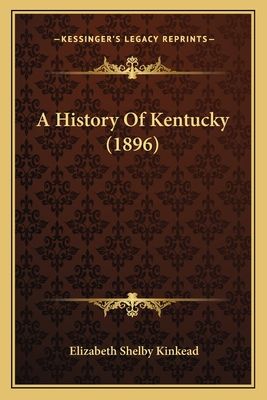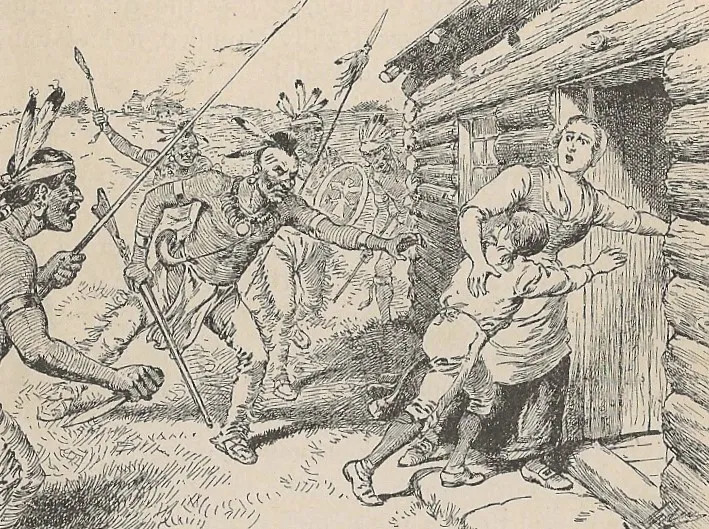
Republican lawmakers looking for a new Kentucky history textbook that captures the spirit of SB1 might consider Elizabeth Shelby Kinkaid’s A History of Kentucky, which was published in 1896 and 1909 and revised in 1916.
The author said she wrote the book to inspire schoolkids to be “spiritual warriors to aid in purifying the political life of the State and the nation.”
GOP lawmakers who passed SB1 over Gov. Andy Beshear’s veto insist it wasn’t an anti-Critical Race Theory bill, though the legislation reflected the national right-wing wig-out over the scholarly study of systemic racism in law and society. (CRT is taught in law schools and some graduate schools, not elementary and secondary schools.)
“Republican politicians and pundits love to claim liberals are easily ‘triggered’ ‘snowflakes,’ but when it comes down to it, it appears conservatives are actually the most ridiculously sensitive people on earth,” Vanity Fair’s Bess Levin wrote in a story about the Democrat Beshear’s veto. “There are many data points to support this conclusion, but one of the biggest is probably their current crusade to ban schools from teaching race in America in a historically accurate way, i.e., a way that might make white people a little — or very — uncomfortable. That’s led to a raft of bills from the party of ‘personal freedom’ dictating what can and cannot be said in the classroom.”
Added Levin: “As CNN notes, S.B. 1 states that public schools must provide instruction that makes it clear that ‘an individual, by virtue of the individual’s race or sex, does not bear responsibility for actions committed by other members of the same race or sex,’ and that ‘the institution of slavery and post–Civil War laws enforcing racial segregation and discrimination were contrary to the fundamental American promise of life, liberty, and the pursuit of happiness, as expressed in the Declaration of Independence, but that defining racial disparities solely on the legacy of this institution is destructive to the unification of our nation.’ In other words, teachers would have had to explain to their students that while slavery and Jim Crow-era segregation were bad, they really amounted to more of a ‘few bad apples’ situation that has no impact on America today.”
She concluded that SB1, “while not using critical race theory — the right’s bogeyman du jour — explicitly, quite obviously attempts to require what teachers discuss with their students when it comes to race.”
Murray State University historian Brian Clardy said SB1 (and similar bills Republican lawmakers and governors are pushing and passing in other states) are calculated to whitewash more than Black history. Besides Blacks, short-shrifted constituencies include women, immigrants, Native Americans, Asian Americans, Jews, Muslims and LGBTQ people – in other words, anybody who’s not a white, straight, conservative, Anglo-Saxon, Christian male, according to Clardy.
White, straight (presumably), conservative Anglo-Saxon Christian (culturally, at least) menfolk are the main heroes of Kincaid’s history book. It ends in 1915, so a second volume might be needed. Kentucky Republicans should be able to find an author to their liking at, say, Liberty or Bob Jones universities.
Anyway, in the preface to her book, Kinkaid pledged that she stuck “to facts as closely as they could be ascertained” and that she tried to make the book “historically sincere.”
Here are some examples from Part I, entitled “PIONEER DAYS”:
– The pioneers, or first white men who came to Kentucky, had to contend not only with the wild beasts of the forest but with the equally savage Indian warriors.
– The pioneers were men sent forth by the wisdom of God to found a new Commonwealth. They went in peace, but with their rifles cocked to defend their lives from the Indians.
– [Daniel Boone] was an instrument in the hands of God to open the way for the foundation of a great Commonwealth.
In Part IV, entitled “THE CIVIL WAR,” Kincaid wrote about enslaved Kentuckians:
– On the great landed estates of the Commonwealth the lot of the slave was comparatively happy.
– While they greatly desired freedom, they were as a class a peaceable people that dreaded change.
– They knew the life they were living. It had sore trials; but they realized that they would always be provided for. ... Moreover, the careless, irresponsible existence they led made them unthinking.
– They lived for the moment, and if they could steal off at night and meet together at some neighboring ‘quarters’ for a dance, they gave themselves up to the frolic with reckless disregard of the punishment which might follow on the morrow.
Clardy agrees that a book like A History of Kentucky would be a hit among white folks who are fans of SB1. “It’s the kind of MAGA anti-intellectual bull they want to bring back in the classroom,” he said.
So how about it, Republicans? Should we order a reprint of this book so you can mandate its use in our classrooms?
--30--








